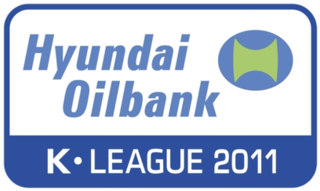
The Ulsan Munsu Stadium, nicknamed Big Crown Stadium, is a stadium in Ulsan in South Korea. It is home to the Ulsan Hyundai FC.

The 2002 Asian Games, also known as the XIV Asiad, were an international multi-sport event held in Busan, South Korea from September 29 to October 14, 2002 with the football event commenced 2 days before the opening ceremony.
The 2001 FIFA Confederations Cup was the fifth FIFA Confederations Cup and the third to be organised by FIFA. It was also the first in which the original hosts, Saudi Arabia, did not participate. The tournament was played from 30 May to 10 June 2001, and co-hosted by South Korea and Japan, who were also hosts for the 2002 FIFA World Cup finals. It was won by France, beating hosts Japan 1–0, with a goal from Patrick Vieira.

The FIFA U-17 World Cup 2007, the twelfth edition of the tournament, was held in South Korea between 18 August and 9 September 2007. For this event, the number of teams had been expanded from 16 to 24, with the top two of each group and the four best third-place teams advancing to the Round of 16. Also, from now on, the confederation which produced the last champion, in this case CONCACAF, had an extra spot in the qualifying rounds.
The Super Cup was a traditional curtain-raiser to the Korean football season since its inception in 1999. Played between the K League champions and Korean FA Cup holders, Jeonbuk Hyundai Motors are the only non-champions to have lifted the Super Cup trophy. The tournament was dropped from the Korean football calendar in 2007.
The 2005 season of the K-League kicked off on May 15. The season and playoff format was the same as the one used in the 2004 season. The playoff fixtures are set to take place in late November and early December.

Ulsan Hyundai Mipo Dockyard Dolphin was a South Korean football club based in the city of Ulsan. They competed in the National League between 2003 and 2016. They were owned and operated by Hyundai Mipo Dockyard and played their home games at Ulsan Stadium.

Ulsan Stadium is a multi-purpose stadium located in Ulsan Sports Complex, Ulsan, South Korea. Originally there was Ulsan Civic Stadium which opened in 1970. The original stadium was demolished in 2003 and replaced with Ulsan Sport Complex. Ulsan Sports Complex consists of the Ulsan Stadium and Dongchun Gymnasium. Ulsan Stadium is a multi-purpose stadium which is mainly used for football; it was the home ground of the Ulsan Hyundai before they moved to Ulsan Munsu Football Stadium in 2001 and was the home stadium of Ulsan Hyundai Mipo Dockyard between 2005 and 2016. The stadium has a capacity for 19,471 spectators.
1998 Korean FA Cup, known as the Sambo ChangeUp FA Cup for sponsorship reasons, was the 3rd edition of the Korean FA Cup.
2000 Korean FA Cup, known as the Seoul Bank FA Cup for sponsorship reasons, was the 5th edition of the Korean FA Cup.
The 1996 K League was the 14th season of K League since its establishment in 1983.
The Korea National League 2008 season operates its season in two stages, with the winners of each stage and the two runners-up advancing to the post-season championship playoffs.
In 1999 season, There were two Korean League Cup competitions. One is Adidas Cup 1999 and the other is Daehan Fire Insurance Cup 1999.
This article is regarding Daehan Fire Insurance Cup 1999

The 2011 edition of the K League was the 29th since its establishment in 1983. The 2011 season was known as Hyundai Oilbank K-League 2011 due to the competition's sponsorship by Hyundai Oilbank. FC Seoul were the defending champions, having won their fourth title the previous season.

The 2011 Korean League Cup, known as the Rush & Cash Cup for sponsorship reasons, was the 19th and final season of League Cup competition for K League's 16 football clubs. The competition began on 16 March 2011, and ended with the one-legged final on 13 July 2011.
The 2011 Korea National League season was the ninth season of the Korea National League. The postseason playoff's teams were expanded by 6 teams and the playoffs were operated in the same format as the K-League Championship. In the 2011 season, Yesan FC withdrew from the league due to financial difficulties.
The 2012 Korea National League season was the tenth season of Korea National League. The 2012 season operated in the same way as the 2011 season. Six teams competed in the postseason play-offs.

The 2012 AFC Champions League knockout stage was contested by a total of 16 teams. They included the 8 group winners and the 8 group runners-up from the group stage.
The 2012 AFC Champions League Final was a football match which was played on Saturday, 10 November 2012, to determine the champion of the 2012 AFC Champions League. It was the final of the 31st edition of the top-level Asian club tournament organized by the Asian Football Confederation (AFC), and the 10th under the current AFC Champions League title.










